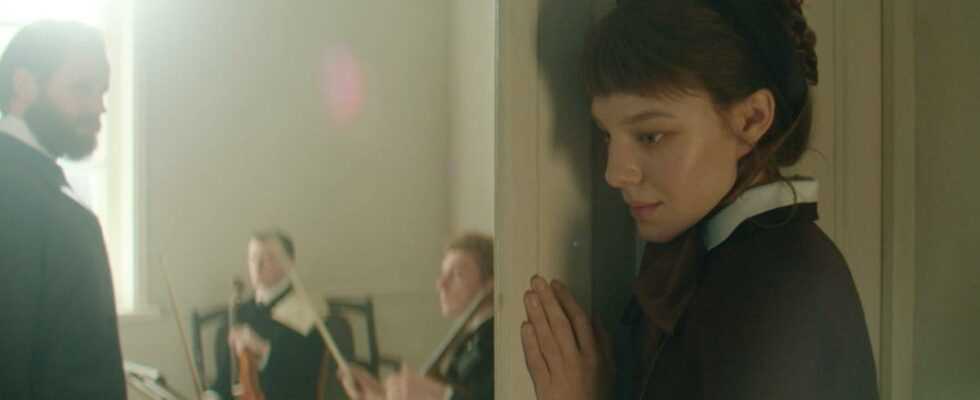The Russian filmmaker, exiled in Berlin, is present for the first time at the Cannes Film Festival, in competition with Tchaikovsky’s Wife. The film focuses on the life of Antonina Miliukova, wife of composer Piotr Tchaikovsky who married her to hide his homosexuality.
Who was Antonina Miliukova? The enfant terrible of Russian cinema Kirill Serebrennikov examines Tchaikovsky’s life through the eyes not of the genius composer but of the woman he married to hide his homosexuality and protect his family.
Read alsoKirill Serebrennikov, pet peeve of the Kremlin, back at the Cannes Film Festival
Half a century after the Soviet biopic by Igor Talankin (1969) and The Pathetic Symphony by Ken Russell (1971), Tchaikovsky’s Wifethe first of 21 films in the running for the Palme d’Or, promises a more intimate insight into the brief and disastrous marriage of Piotr Ilitch Tchaikovsky.
“It’s not a biopic, he’s not the main character. It’s a film about a few episodes of his life and about a woman who was obsessed with him.” explained to AFP Kirill Serebrennikov, during an interview conducted in April 2022 in Berlin where he is now installed. “It shows her version of events and it’s interesting because Antonina Milioukova is a completely forgotten character,” continues the director, for whom this film is the “beginning of a long journey” in the world of the composer of Swan Lake.
“A Terrible Lie”
A few years ago, when Serebrennikov was seeking public funding for this film, ex-Minister of Culture Vladimir Medinsky (currently head of the Russian delegation to negotiations with Ukraine), “wanted us to follow the Soviet version” of the composer’s life, he says. “But this film is a terrible lie”. In Russia, “Tchaikovsky is a monument which has not suffered, which has had no private life”, he specifies. For him, his intimate life remains “unknown to the Russians just like Chekhov , Dostoyevsky Where Tolstoy ». Refuting any sensationalism in his film, Serebrennikov says he wants to show in part how this tumultuous relationship was also a source “inspired by his extraordinary works”.
If the composer’s homosexuality had been known for a long time, passages from Tchaikovsky’s letters published without censorship for the first time in 2018 revealed his heartache or his desires for men. “I met a young man of striking beauty (…) after our walk, I offered him money, which he refused”, he wrote in 1880 to his brother Modeste, also a homosexual and librettist of his opera The Queen of Spades. The same year, he describes his servant Alexei Sofronov, his lover and then faithful friend, as “an angelic creature” which he would like to be “the slave, the plaything, the property”.
These passages had been censored after his death, first by his brothers and then during the Soviet era. “So far, many people don’t believe it and consider it an attempt to tarnish the reputation of the best Russian composer,” told AFP Marina Kostalevsky, professor of Russian at Bard College in New York who co-published the collection of letters.
“to be normal”
According to her, Tchaikovsky married Antonina Miliukova, a former student of the Moscow Conservatory who had sent him a letter of admiration, because “he wanted to be normal in the eyes of society”. “I want to get married or have a public relationship with a woman to shut up all these bastards whose opinions I don’t care about but who make people close to me suffer”, he wrote to Modeste in 1876. But the composer “quickly realized his mistake (…), he described to his brother Anatoly how torture it was to be with her and that he found her physical proximity revolting”, explains Marina Kostalevsky. He even tries to kill himself in a freezing river.
And Antonina Miliukova? For a long time, biographers blamed all of Tchaikovsky’s suffering on her, calling her mad – he himself called her “viper” -, but today research is more nuanced. In Antonina Tchaikovskaya: Story of a Forgotten Life by Valery Sokolov, the author “attempts to show that she was not this monster described by certain biographers”, says Professor Kostalevsky. Antonina’s life, which ended up in a psychiatric hospital, “was completely destroyed”.
Despite the brevity of their cohabitation – they would never divorce – it was during this period that the composer created one of his masterpieces, the opera Eugene Onegin influenced by this impossible relationship.
